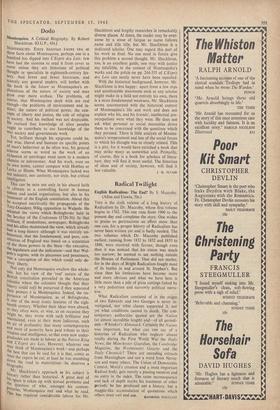Radical Twilight
English Radicalism: The End? By S. Maccoby. (Allen and Unwin, 70s.)
Tins is the sixth volume of a long history of Radicalism by Dr. Maccoby, whose first volume begins in 1762. This one runs from 1906 to the present day and completes the story. One wishes to praise so pertinacious an effort more than one can, for a proper history of Radicalism has never been written yet and is badly needed. The two volumes which Dr. Maccoby published earliest, running from 1832 to 1852 and 1853 to 1886, were received with favour, though even then it was noticed that his vision was much too narrow; he seemed to see nothing outside the Houses of Parliament. That did not matter, for in the days of Bright Radicalism fought most of its battles in and around St. Stephen's. But since then his limitations have become more and more obvious and what we have here is little more than a pile of press cuttings linked by a very pedestrian and narrowly political narra- tive.
What Radicalism consisted of in the reigns of two Edwards and two Georges is never in- vestigated, nor what classes supported it, nor yet what conditions caused its death. The con- temporary authorities quoted are the Nation (at almost incredible length) and—of all periodi- cals—Whitaker's Almanack. Certainly the Nation was important, but what can one say of a' historian of Radicalism who neglects almost totally during the First World War the Daily News, the Manchester Guardian, the Cambridge Magazine, the Westminster Gazette and the Daily Chronide? There are unending extracts from Massingham and not a word from Nevin- son and many others. The Union of Democratic Control, Morel's creation and a most important Radical body, gets merely a passing mention -and no entry in the index. The same inconsequence and lack of depth marks his treatment of other periods; he has produced not a history, but a magpie-like accumulation of quotations which


































 Previous page
Previous page